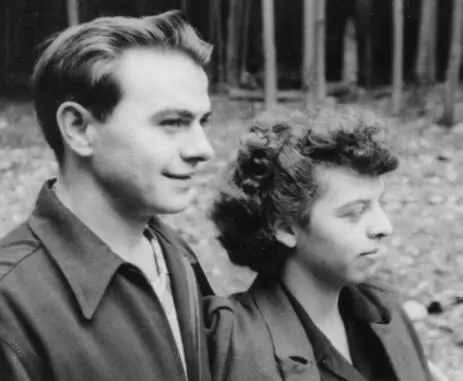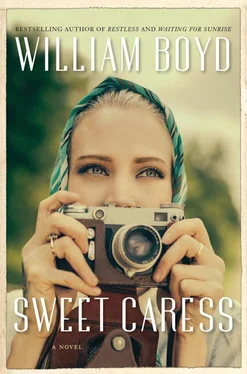‘Amory’s our new star photographer from England.’
‘Congratulations. I’d like a cigarette, Cleve.’
A figured brass box was found, proffered, cigarette selected, lit. I said no thank you, gulping at my potent brandy. She had an unusual, arresting face, Frances. Pale hooded blue eyes, a high forehead, a mannish face — her looks compromised by a poor buckled perm of her auburn hair, crimped over her ears. She could have afforded better, in my opinion.
‘Happy birthday,’ I said, raising my glass.
‘A watershed,’ she smiled away the compliment. ‘Nobody’s going to be spared. That’s one consolation.’
Was that for my benefit, I wondered? In the event we talked away, politely. How was I finding New York after London? Had I a decent apartment? How she adored the Village. Photography was the democratic art form of our age. She loved taking photographs, herself. Snap, snap, snap.
‘Why don’t you wheel me out into the world, Cleve. And fetch me a shawl. I’ll brave the elements.’
I followed them out on to the terrace and then darted away, making my temporary farewells, and raced for the marquee where I gulped down a glass of the alcoholic fruit punch and smoked a cigarette.
Phil and Irene ambled by.
‘Hey, there’s Amory. Thought we’d lost you. Having fun?’
‘Why didn’t you tell me, Phil?’
‘Tell you what?’
‘That Frances was in a fu—. In a flipping wheelchair.’
‘I thought you knew. Everyone knows.’
‘I didn’t.’
‘It’s like Roosevelt has callipers. Our esteemed president is a cripple. Everyone knows, nobody bothers to mention it.’
‘Well, it was a bit of a shock. What happened to her?’
‘Car smash,’ Irene said. ‘Just after the little one was born.’
‘Lincoln,’ Phil said. ‘No. Harry. Lincoln? What’s the youngest called?’
‘Lincoln. There was a crash,’ Irene continued. ‘Awful. And she’s been in a wheelchair ever since. With the two little boys. . Very sad.’
I was calculating. If Lincoln was four or five she’d been in a wheelchair for many years, now. I looked round, distractedly, and saw Cleve signalling to me from an opening at the end of the marquee.
‘I’ll be right back,’ I said and headed off.
Cleve and I wandered out into the garden and down a wide flight of steps towards an ornamental lake fringed with bullrushes and teazles. A dozen geese cruised about on the water. There was a boathouse encrusted with gingerbread moulding with a jetty and an extravagantly prowed giant canoe moored to it.
‘You somehow forgot to tell me your wife was confined to a wheelchair,’ I said, managing to keep my voice calm.
‘I don’t even think about it. It’s been years now.’
‘Well, it was a bit of a shock to me. To put it very mildly.’
He looked at me. ‘You know how I feel about you, Amory. It doesn’t change anything.’
‘I’m sorry, but I think it does.’
‘I needed you to see for yourself.’
‘Why?’
‘Because I can’t leave her, obviously.’
‘Obviously.’
‘I was driving the car when we had the accident. We’d both been drinking but it wasn’t my fault. Some kid in his dad’s Buick swiped us and we rolled down an embankment. I had a bruised elbow. Frances broke her spine — became paraplegic.’
‘My God. How awful.’
We stood silent by the lake looking at its choppy, slatey waters. I hugged myself. I had an overwhelming urge to leave.
‘That’s why I wanted you to meet her,’ he said in his entirely reasonable way, ‘so you could understand.’
‘Understand what?’
‘What we will have. You and me.’
‘You’ve lost me. What’re you talking about? What do we have? You and me.’
‘Everything. Everything — short of marriage. But, all the same, a marriage of two people, of two minds, in everything but its judicial formalities.’ He faced me. ‘I want to kiss you. To hold you. These are just words. I want you to feel the love I have for you. I love you, Amory. I need you to be part of my life.’
‘I need to think. .’ I thought I might faint, then, and topple into the cold lake. I stepped back. ‘Think about it all. Take it in.’
I turned and walked away without looking round. I was remembering something my father used to say. ‘Inertia is a very underrated state of mind,’ he once told me. ‘If you feel you have to make a decision then decide not to make a decision. Let time pass. Do nothing.’ Which was what I decided to do. I returned to the terrace, picked up my bag and my camera and set off in search of Phil Adler.
Phil said he and Irene weren’t ready to leave but he would drive me to the station at New Hastings where I could catch a train back to the city. He wandered off to find his car while I mooched about the hall and the big drawing room, trying to keep my brain inert and ignore the clamouring contradictions that were queuing up to be heard. As I prowled around, distracting myself, I saw a small, framed photograph amongst a clutch of others on a side table. It was an impromptu photo of Cleve and Frances, not looking at the camera, in near profile, both of them in casual clothes and taken early in their marriage, I imagined, long before the accident. I picked up the frame — tortoiseshell — and swung the little brass clips free on the back. I pocketed the photo and slid the frame into a bureau drawer. I had no idea why I’d done this or what had prompted me — it was a strange kind of trophy, I supposed, something that I had stolen and could keep and that would remind me of this cold afternoon in Connecticut: a symbol of something that had ended or was about to end.
I strolled back into the hall and saw Frances saying goodbye to a couple. I froze but she turned at that moment and saw me. She wheeled her chair round and propelled herself towards me, smiling her empty hostess smile.
‘You’re not leaving already, are you?’
‘I’m going back to England tomorrow,’ I lied, easily. ‘Still a lot of packing to do.’
She looked up at me from her chair — a fine ebony seat and bleached woven strand-cane, as elegant a wheelchair as money could buy, I thought — though she might as well have been looking down from some elevated throne, such was the regal hauteur and condescension in her manner.
‘Cleve is sleeping with you, isn’t he?’
‘Don’t be absurd! Really, what a—’
‘Of course he is. I can always tell which ones are his girls.’
‘I refuse to dignify your disgraceful accusation by any kind of—’
‘You’re not the first since my accident, Miss Clay. You may be the fourth or fifth — I don’t keep a precise count. One thing I’m sure of, though: you won’t be the last.’
She wheeled herself away but not before delivering a little pitying smile at me. I watched her leave the hall. Smug, frightened, powerful, threatened. Phil Adler ducked his head round the front door. Ready to go?

Cleveland and Frances Finzi, about 1929, before the accident. The photo that I stole.
I COULDN’T SEE CLEVE after the Connecticut Incident, as I referred to it. I told the office I’d been diagnosed with a bad case of pleurisy and would be confined to bed for at least a week.
Of course, Cleve telephoned and I didn’t answer. And then he came down to Washington Square, buzzed the buzzer, somehow gained admittance, beat on the door and, when I didn’t respond, slipped a note under it saying ‘I’ve been phoning. We have to speak. Everything is fine. I love you, C.’
Читать дальше













